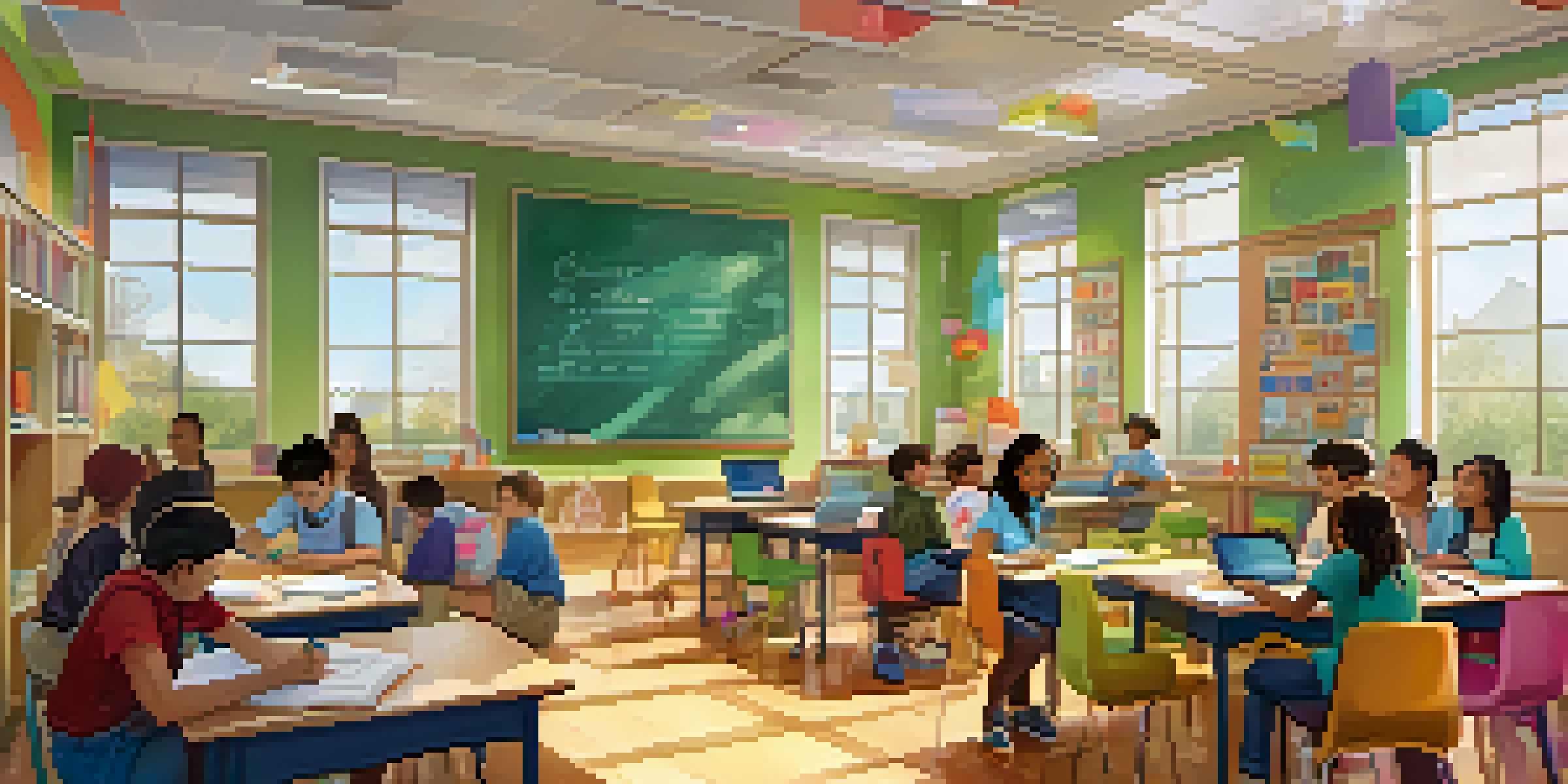Inquiry-Based Learning in a Post-Pandemic Education Landscape

Understanding Inquiry-Based Learning in Current Education
Inquiry-based learning (IBL) encourages students to ask questions and seek answers, fostering a more engaging educational experience. In today's post-pandemic landscape, this method is gaining traction as educators recognize its potential to enhance critical thinking and problem-solving skills. IBL transforms the traditional classroom dynamic, shifting the focus from the teacher to the learner, which can make education feel more relevant and personalized.
Inquiry-based learning is not just a method; it’s a mindset that encourages curiosity and exploration.
For instance, rather than simply memorizing facts, students might investigate real-world issues or conduct experiments, allowing them to connect the curriculum to their lives. This hands-on approach not only boosts engagement but also cultivates a deeper understanding of the material. As schools adapt to new teaching methods, IBL stands out as a powerful tool to meet the diverse needs of students.
Moreover, the flexibility of IBL makes it particularly suitable for hybrid and remote learning environments, which have become more common since the pandemic. Teachers can facilitate inquiry-driven projects online, providing students with the autonomy to explore topics that interest them. This adaptability ensures that learning continues to thrive, regardless of the format.
The Role of Technology in Inquiry-Based Learning
Technology has transformed the way we approach inquiry-based learning, providing robust resources for both educators and students. Digital tools, such as interactive simulations and online databases, allow learners to conduct research and gather data with ease. This access to information can spark curiosity and drive deeper inquiry, as students can explore topics that captivate their interest.

For example, platforms like Google Earth enable students to investigate geographical phenomena, while virtual labs let them conduct experiments safely from home. Such resources not only enhance the learning experience but also prepare students for a tech-savvy world. As we embrace these tools, it's essential to ensure that technology complements the inquiry process rather than overshadowing it.
Inquiry-Based Learning Engages Students
Inquiry-based learning (IBL) shifts the focus from teachers to students, fostering critical thinking and real-world connections.
Additionally, technology facilitates collaboration among students, allowing them to work together on projects regardless of location. Online forums and collaborative tools enable discussions and idea-sharing, creating a sense of community even in remote settings. This connectedness enriches the IBL experience, as students learn from each other while pursuing their inquiries.
Adapting Curriculum for Inquiry-Based Learning
As schools shift towards inquiry-based learning, adapting the curriculum becomes crucial to its success. Traditional lesson plans often emphasize rote memorization, which doesn't align with the exploratory nature of IBL. Instead, educators must develop units that encourage exploration, critical questioning, and application of knowledge in real-world contexts.
Education is not the filling of a pail, but the lighting of a fire.
One effective strategy is to integrate project-based learning, where students work on extended projects that require research and problem-solving. For example, a science class might investigate local environmental issues, prompting students to propose solutions based on their findings. This type of curriculum not only aligns with IBL principles but also makes learning more meaningful and engaging.
Moreover, professional development for teachers is essential to equip them with the skills needed to implement this new curriculum. Workshops and training sessions can help educators understand how to foster inquiry in their classrooms effectively. By investing in teacher training, schools can create an environment that truly supports inquiry-based learning.
Fostering a Culture of Inquiry in Schools
Creating a culture of inquiry within schools is vital for the successful implementation of IBL. This culture encourages curiosity, questioning, and exploration among both students and teachers. Schools can cultivate this environment by promoting open discussions, where students feel comfortable sharing their ideas and questions.
Encouraging teachers to model inquiry-based practices is another key factor. When educators demonstrate their own curiosity and engage in inquiry, they inspire students to do the same. Simple actions, like asking open-ended questions during lessons, can significantly shift the classroom atmosphere towards one that celebrates inquiry.
Technology Enhances Inquiry Learning
Digital tools facilitate research and collaboration, making inquiry-based projects accessible in both traditional and remote settings.
Additionally, involving parents and the community in the learning process can further enhance this culture. Schools can host events or workshops that showcase student inquiries, inviting families to participate. This not only strengthens the school community but also reinforces the value of inquiry beyond the classroom.
Assessing Inquiry-Based Learning Effectively
Assessment in inquiry-based learning requires a shift from traditional testing methods to more holistic approaches. Standardized tests often fail to capture the depth of understanding that IBL promotes. Instead, educators should consider alternative assessment methods that evaluate students on their process of inquiry as well as their final products.
For instance, using portfolios allows students to showcase their work over time, reflecting their growth and learning journey. Teachers can assess not just the final outcome but also the steps taken to arrive there, including research, collaboration, and critical thinking skills. This comprehensive evaluation aligns with the goals of IBL, highlighting the importance of the learning process.
Peer and self-assessments are also valuable tools in this context. By encouraging students to reflect on their own work and that of their peers, they gain insights into their learning and develop critical evaluative skills. Incorporating these assessment methods can foster a culture of continuous improvement and self-directed learning.
Challenges and Solutions in Implementing IBL
While inquiry-based learning offers many benefits, its implementation can present challenges. One significant hurdle is the time required for students to engage deeply in inquiry, which can be difficult to balance with curriculum demands. Educators often feel pressured to cover a set number of topics, leading to a more traditional approach.
To address this, schools can prioritize inquiry-based units within the curriculum, allowing for extended exploration of select topics. By integrating IBL into existing subjects rather than treating it as an add-on, teachers can create a seamless learning experience that meets curriculum requirements while fostering inquiry. Collaborative planning among educators can also help streamline this process.
Curriculum Must Adapt for IBL Success
Adapting the curriculum to emphasize exploration and inquiry is essential for effectively implementing inquiry-based learning in schools.
Additionally, some teachers may feel uncertain about facilitating inquiry effectively. Professional development can provide the necessary support, offering strategies and resources to guide educators in this transition. Building a network of teachers who share best practices can also create a supportive environment for those new to IBL.
The Future of Inquiry-Based Learning in Education
Looking ahead, the future of inquiry-based learning appears promising in the post-pandemic education landscape. As educators and students alike have adapted to new ways of teaching and learning, the focus on inquiry can lead to more resilient and adaptable learners. With a world that is constantly changing, the skills fostered through IBL—such as critical thinking and problem-solving—are more valuable than ever.
Furthermore, as educational technology continues to evolve, it will further enhance the inquiry experience. Innovations in virtual reality, artificial intelligence, and collaborative platforms can open up new avenues for exploration and engagement. The possibilities for inquiry-based projects are limitless, enabling students to investigate global issues and collaborate across borders.

Ultimately, embracing inquiry-based learning can transform education into an experience that is not just about acquiring knowledge but about developing lifelong learners. By fostering curiosity and a love for learning, we prepare students for a future where they can navigate complexities and contribute meaningfully to society.